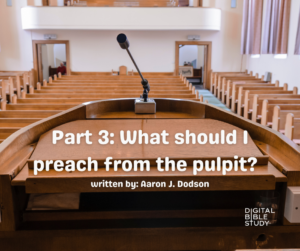Neil Richey
In one of the unsung chapters of the Bible, Romans 16, are these words, “Salute one another with an holy kiss. The churches of Christ salute you” (Rm. 16:16). When writing on the duty of church leaders, Luke wrote, “Take heed therefore unto yourselves, and to all the flock, over the which the Holy Ghost hath made you overseers, to feed the church of God, which he hath purchased with his own blood” (Acts 20:28). As the Hebrews writer spoke to the living saints about their deceased brethren, he said, “To the general assembly and church of the firstborn, which are written in heaven, and to God the Judge of all, and to the spirits of just men made perfect” (Heb. 12:23). On the day of Pentecost, when Peter preached his first gospel sermon, we read that three thousand souls repented of their sins and were baptized for the forgiveness of those sins. Then, at the end of this same chapter are these words, “Praising God, and having favour with all the people. And the Lord added to the church daily such as should be saved” (Acts 2:47).
“Churches of Christ,” “church of God,” “church of the firstborn,” and “the church” are all references to the same thing–the church that we read about in the Bible. One would think that the religious world’s desire is to be part of that church. However, a cursory perusal of our own communities shows that there are many who are religious, and nearly as much whose religion is in vain. How do I know? Drive down the street, take down the name of every church you see on those church signs, and then ask yourself, “Is that the name of the church I read about in the Bible?” If it’s not, then red flags should be going up in your mind.
Perhaps to you the name is not all that important. I think the Lord would disagree with you on that one. So, is there really anything in a name?
Following the end of one of the deadliest wars ever fought, the Civil War, Robert E. Lee was asked by the Louisiana Lottery if he would be willing to allow his name to be used to advertise their commission. They told him that if he agreed, he would become incredibly wealthy. Lee couldn’t believe the proposition. Standing up, buttoning his gray coat, and then with a loud voice Lee said, “Gentlemen, I lost my home in war. I lost my fortune in the war. I lost everything except my name. My name is not for sale, and if you fellows don’t get out of here, I’ll break this crutch over your heads!”
He would have had my attention. How about you? In the Bible, God warns us not to let the great schemer of the universe manipulate us into allowing our name to be misused and abused. Additionally, he warns us not to take the most sacred names for His church and then change them to fit our own personal designs for His church.
To illustrate that there really is something in a name, can you think of any Bible characters whose names became synonymous with something less than admirable? Two immediately come to my mind: Jezebel and Judas.
The Old Testament character Jezebel was a horrible creature. A read through the book of 1 Kings tells us of the atrocities that she was behind. She killed the prophets of God. She manipulated her husband. She killed Naboth, by proxy, so that her husband could have Naboth’s vineyard. Her name is so synonymous with wickedness that no one would think of naming his or her newborn girl Jezebel. Why? There is something in a name.
The New Testament character Judas died by his own hands, and the Bible says that he “went to his own place” (Acts 1:25). Judas, or “the son of perdition” as he is also called, is the one who betrayed the Lord Jesus for money (Jn. 17:12). He turned his back on God for momentary pleasure and that which brings material happiness.
So, today, how many parents expecting baby boys to be born have picked out the name “Judas” as their name of choice for their new little bundle of joy? I’m not aware of any. Why? There is something in a name.
Though rather lengthy, this illustrates the fact that names are important. There is something in a name. There is something in a name when it comes to what people call you. Then also, there is something in a name when it’s applied to what one calls the collective body of Christians. If the name of the church you belong to cannot be found in the Bible, then doesn’t it stand to reason that you should find a church that does wear the right name, and then become a member of it?
By way of this study, we will only make three observations. First, we’ll observe why one should want to be a member of the church we read about in the Bible. Second, we’ll learn how one becomes a member of the church we read about in the Bible. Third, we’ll close our study with three observations on how one is saved and therefore privileged to enjoy the benefit of being part of the church we read about in the Bible.
I Want to be a Member of the Church of the Lord Because . . .
To be a member of the Lord’s church is to have access to all “spiritual blessings.” “Blessed be the God and Father of our Lord Jesus Christ, who hath blessed us with all spiritual blessings in heavenly places in Christ” (Eph. 1:3). The expression “heavenly places” in this context is a reference to the church, which is located “in Christ.” What are some of those blessings?
- Acceptance is a blessing that comes to those in His church. “To the praise of the glory of his grace, wherein he hath made us accepted in the beloved” (Eph. 1:6). The Lord never accepts anyone on their own terms, but the Lord’s.
- Redemption and forgiveness are blessings that come to those in His church. “In whom we have redemption through his blood, the forgiveness of sins, according to the riches of his grace” (Eph. 1:7). Redeem means to be bought back. Sin is a costly thing indeed. It costs us more than we could ever pay. So, for that debt to be forgiven, it took something more valuable than money. It cost Jesus His life’s blood. “For this is my blood of the new testament, which is shed for many for the remission of sins” (Mt. 26:28).
- An eternal inheritance is a blessing that comes to those in His church. “In whom also we have obtained an inheritance, being predestinated according to the purpose of him who worketh all things after the counsel of his own will” (Eph. 1:11). Paul, through the eyes of faith, was looking at that inheritance when he wrote down these words, “Henceforth there is laid up for me a crown of righteousness, which the Lord, the righteous judge, shall give me at that day: and not to me only, but unto all them also that love his appearing” (2 Tm. 4:8).
- The seal of the Holy Spirit is a blessing that comes to those in His church. “In whom ye also trusted, after that ye heard the word of truth, the gospel of your salvation: in whom also after that ye believed, ye were sealed with that holy Spirit of promise” (Eph. 1:13). A seal is something that is true and binding. A seal proves one’s authenticity. So, when one is a member of the church of the Lord, God has put his seal on that person showing His recognition of the fact that he or she is an authentic Christian, and member of God’s church.
Now, how does one become a member of the Lord’s church, thereby receiving His approval?
I Become a Member of the Church of the Lord by . . .
Doing it the Lord’s way. So many try to invent ways for man to gain membership into the church of the Lord. Some man-made churches will vote on an individual, and if he or she receives enough votes they become members. Many denominations who teach salvation via the “sinner’s prayer” are then to be baptized to join a particular denomination. Then, there are others who say, “Just join the church of your choice.”
The “sinner’s prayer” is not found anywhere in God’s word. Never in the Bible do we read about people being voted into the church of the Lord, nor do we read about their joining the church of the Lord. What we do read is this, “And the Lord added to them [the church KJV] day by day those that were saved” (Acts 2:47 ASV). Those who are truly saved are added to the church, because the saved are the church. So, the answer to the questions “How do I become a member of the Lord’s church?” and “What must I do to be saved?” will be the same.
We want to conclude this essay with three salvation questions:
- Will there be few saved? Luke wrote, “Then said one unto him Lord, are there few that be saved?” (Lk. 13:23). Throughout history, God’s people have always been in the minority. For instance, when God destroyed the world with a flood, only eight souls were saved: Noah, his wife, their three sons, and their wives. When God destroyed the city of Sodom, only three souls were saved: Lot, and his two daughters. In answer to the question, the Bible teaches that on the Judgment Day, few will be saved. Jesus said, “Enter ye in at the strait gate: for wide is the gate, and broad is the way, that leadeth to destruction, and many there be which go in thereat: Because strait is the gate, and narrow is the way, which leadeth unto life, and few there be that find it” (Mt. 7:13-14).
- Who then will be saved? The Universalist would answer the question, “Everyone will be saved.” The moralist would answer the question, “All moral people will be saved.” The denominationalist would answer the question, “All people will be saved as soon as they believe.” Our concern should be about whom God says will be saved. Jesus said, “Not every one that saith unto me, Lord, Lord, shall enter into the kingdom of heaven; but he that doeth the will of my Father which is in heaven” (Mt. 7:21). In answer to the question, the only people who will be saved are those who obey God’s word.
- What must I do to be saved? This is clearly the most important question that a man could ever ask. This question was asked three times in the book of Acts. The jailer asked it and received the answer “believe” (Acts 16:30-34). The people on the day of Pentecost asked it and received the answer “repent and be baptized” (Acts 2:37-41). Saul of Tarsus asked it and received the answer “be baptized” (Acts 9:1-22; 22:1-16; 26:1-21). Who could question that these, having done what they were told, were saved? I dare say that no one could.
In answer to the question, “What must I do to be saved?” I must do the same as those in the book of Acts in order to be saved. I must believe in Jesus as God’s Son, just as these did. I must repent of my sins, just as these did. I must be baptized for the forgiveness of my sins, just as these did. When I do this, then I know that I am saved because I have done what they did to be saved. Then, the added benefit is knowing that upon my salvation, the Lord adds me to His church (Acts 2:47).
It is our prayer that you’ll take to heart these simple biblical truths and then become a member of the church that we read about in the Bible. Thank you for taking time to read this short tract, and until next time, God loves you, and we do to.

Are We Speaking Where the Bible Speaks? Part 1
There is an important question that needs to be addressed, and that question is “Are we speaking where the Bible speaks?”

Part 3: What Should I preach from the pulpit
Dear preacher, don’t allow others to prevent you from teaching the whole counsel of God!

What is the Church?
Progressives have successfully shifted our language. We have ceded ground to them they do not own. Their efforts have created enough ambiguity and fluidity around the nature of the church that many no longer believe in the concept of a non-denominational church of Christ. The surest path back is to reclaim the language. The definition of the “church” is as fixed as the definition of a “woman.”

